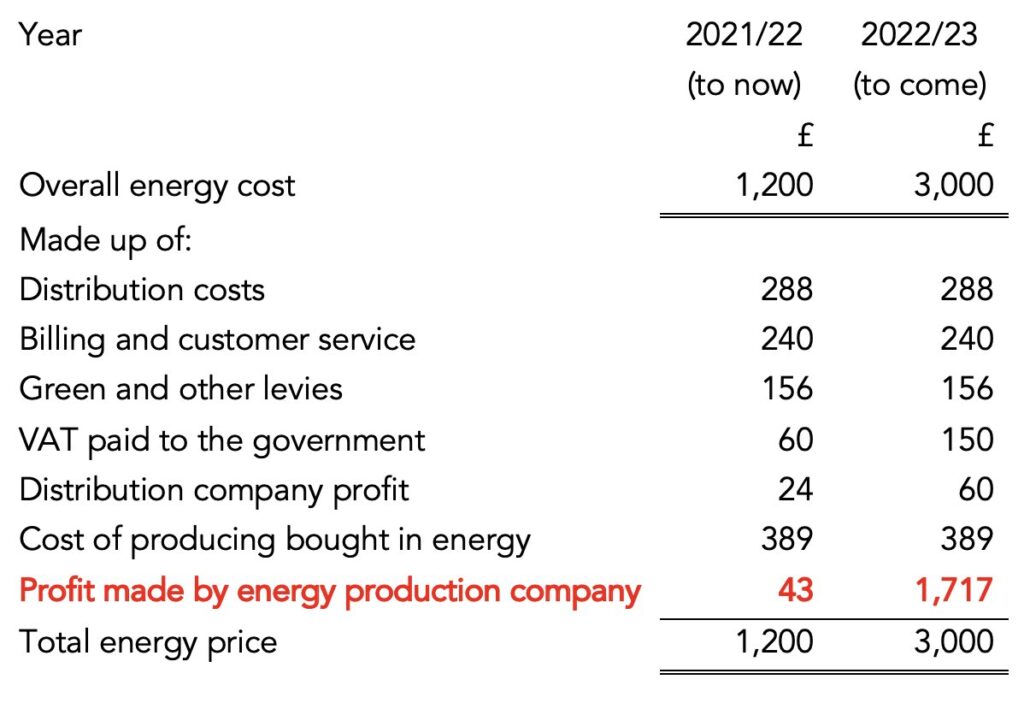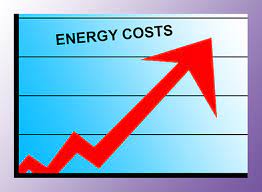
ENERGY price rises are soon going to be the cause of a lot of poverty in the UK, writes Professor Richard Murphy. So, what follows is a bit simplified, but it reveals we’re all about to be ripped off, MASSIVELY.
In January 2020 Scottish and Southern Energy company (SSE) suggested that the cost of the energy they supplied broke down as follows:

Let’s take that SSE data as a reliable benchmark for what’s happened to date. And let’s assume that all the data that I can find that says that the average house paid £1,200 a year for fuel in 2021 is also right. It was pretty much for me, for example.
Now let’s base what energy costs might be on the fixed prices now being made available by the same energy suppliers who were happy to supply our electricity and gas for £1,200 last year. It seems around £3,000 is that new normal. Again, it happens to be for me.
So, the price is increasing by £1,800. But the cost of some things has not changed. For example, the costs of delivery, billing and customer services have not changed, certainly by much. Nor should government and environmental schemes cost more.
To be clear, delivery cost £288 on average in 2021, and I am assuming it still does. Billing and customer service cost £240, and still should. And green and other levies cost £156, and I see no reason why they should change. That’s £684 of cost that should not change, at all.
The government is still taking 5% in VAT. That was (and this is near enough) £60. Now it’s £150. Why you need to be penalised with £90 of extra tax for energy costs going up is for the government to justify. It’s a decision they seem happy with. Take it up with them.
So, of the new £3,000 cost we’ve explained £684 of fixed costs and £150 is VAT. That leaves £2,166 to cover the cost of buying in the energy sold on to you and profit.
In 2021 the cost of bought-in energy was 36%. That was £432. I’ve checked the accounts of UK based energy company. I used SSE again, because that seemed fair. They made a normal profit margin of 11.6% in 2020 and 13.3% in 2021, or say 12% on average.
SSE both makes and distributes energy. Now this is a little simplistic, but let’s assume they make 2% on distributing energy to us and so made 10% on making energy. The profit on energy distribution was £24. That on the bought-in energy was, then, roughly £43.
So now we can work out that the cost of producing the energy that was sold to you in the last year was the bought-in cost to the distribution company of £432 less £43 (near enough) of profit the producer made, or about £389 of real cost of production for the year.
Now let’s assume the profit margin on distributing energy remains at 2%. With the average cost of domestic energy increasing from £1,200 to £3,000 that puts the distribution profit per customer up to £60. That’s two and a half times what it was before. That’s a big jump.
And let’s be clear, that none of the cost of producing energy in the world has changed because of war in Ukraine. In fact, right now, there is not even a shortage of energy in the world because of that war: Russia is still supplying oil and gas right now.
Professor Richard Murphy
So, the only reason for price increases is because oil and gas dealers expect a shortage in oil and gas which has not happened as yet. Bluntly, what we’re seeing is panic buying of oil and gas that’s still in the ground right now by countries terrified that they might run out. It’s vital to remember this: oil and gas are going up in price because people – oil companies, hedge funds and others – are speculating in oil and gas in the expectation that there will be shortages. No one actually thinks the stuff is going to cost more to produce.
It’s vital to remember this: oil and gas are going up in price because people – oil companies, hedge funds and others – are speculating in oil and gas in the expectation that there will be shortages. No one actually thinks the stuff is going to cost more to produce.

In the US they have what are called Antitrust Laws whose whole purpose is to prevent the exploitation of consumers by companies in the marketplace. My argument implicit in this thread is that this is what governments around the world need to be doing now.
More than that, I’m suggesting that if we want to stop Putin winning by making sure millions of people don’t demand the end of sanctions on him because those sanctions lead to them being exploited by energy companies then we need cooperation now to end international exploitation.
Political economy says we can do that. We can reallocate energy supplies between nation states to stop the risk of energy rationing in some. We can use international tax laws – including some I helped create – to track down the profits of energy companies and tax them.
And we can also impose taxes on energy companies at home. There is a straightforward case for a massive increase in taxes on energy companies right now – to be applied to their excess profits, but nothing more.
But more than that, there is something else the government can do. Ofgem, a UK government regulator, does in effect sets UK electricity prices. And it, in effect, prices that energy at the cost of the highest component element in the energy mix – which is gas.
What this means is that even though most electricity is not generated from gas in the UK, we pay for it as if it all is. So the price has skyrocketed even though we all know that the cost of creating renewables, nuclear, hydro and even coal power has not changed.
The government could change that regulation now and bring down electricity prices overnight. France provides evidence that this is possible.
Just as the govermment could also keep green levies fixed (but very definitely keep them, please). It could also cut the rate of VAT so that it takes no more money from us now.
However, none of these things, all of which are possible in the political economy, are happening. So there is a failure of our politicians to stand up to the power of energy companies here, nationally and internationally. And I am calling that out.
Finally as an addition, I know – and said – that the numbers may be a little simplified, but not much. But I would add, that’s just fine. I am showing what can and cannot be controlled, and by who, and I am showing who is exploiting us. And that is deliberate.
This thread is in itself an exercise in political economy. Using the power of logic – and everything I have argued is logical and subject to minor simplifications likely to be as close to the truth as is needed to prove a point – I can show we’re being exploited.
That’s my aim. I want to use the power of Twitter to say that something different to what we are told is inevitable is in fact possible.
What could be different: 1) VAT could be cut 2) Excess profits could be taxed 3) The pricing formula used by Ofgem could be changed and the price of electricity could be cut, a lot 4) Standing charge increases can be challenged 5) International cooperation is possible
What you can do
Share this story
Write to your MP and ask them:
1) Why the gov’t can’t cut the rate of VAT on domestic energy to control prices, when Brexit permits this;
2) Ask why we can’t have an excess profits tax on energy companies;
3) Ask why Ofgem can’t change its electricity pricing formula.
And tell your energy company you are not happy. Ask them what they are going to do about this and post the answers on Twitter.
Exploitation is not acceptable is the message we need to deliver. And right now we are being exploited.
Professor Richard Murphy. @RichardJMurphy Economic justice campaigner. Professor of Accounting Practice, Sheffield University. Chartered accountant. Political economist. Co-founder, the Green New Deal.
Subscribe
Click here for a secure way to sign up, you will be supporting independent news. Click the button below.
Your Opinions
Disagree with this article? why not write in and you can have your say? email us




